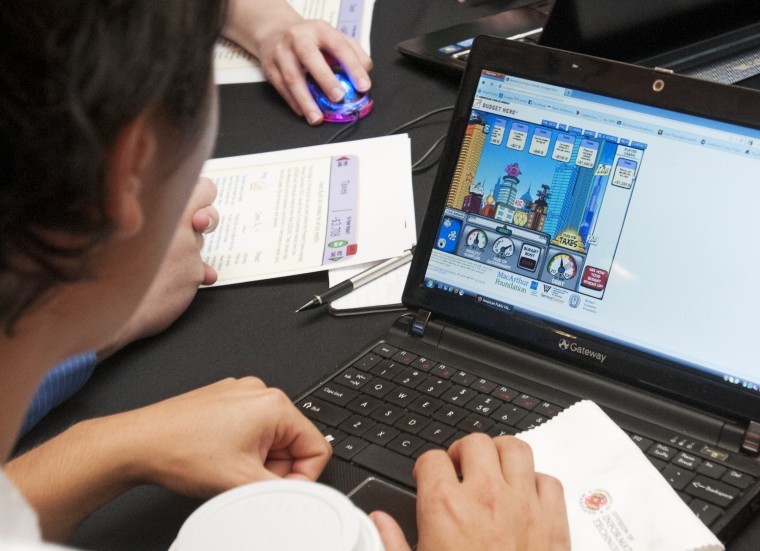
Public policy students made decisions about how to manage the federal budget yesterday while playing the online simulation game “Budget Heroes.”
Students, rather than politicians, were given the power of the nation’s purse strings Wednesday, as creators of a popular online simulation game offered a group of public policy students an opportunity to decide how to manage the federal budget.
It was up to students to choose how to handle the government’s health care, Social Security, infrastructure, education and other programs and expenses while also monitoring revenues through tax code structure and investments in the online game “Budget Hero,” which recently launched a new Election Edition. The role-playing came at a time when a heated presidential campaign has pitted the two political parties against each other when it comes to responsibly managing the nation’s budget.
“It’s a tremendously important exercise to be able to have people just really confront the realities of what so often just gets wrapped up in rhetoric,” said Don Kettl, the public policy school dean. “For these students in particular, what’s also important is that we’re not only talking about the nation’s future — we’re talking about their future.”
The four groups of students varied on their underlying goals for the budget: whether to promote government efficiency, work toward energy independence or simplify the tax code to generate revenue more effectively.
Killing tax cuts was the solution for public policy masters student Adele Byrne and her group.
“That’s one of the most important ways to try and balance the budget … to have more coming in than goes out,” Byrne said.
Others favored cuts to corporate tax rates to give businesses a leg up in the global marketplace.
“For taxes it was pretty much our conflict area, where we couldn’t decide whether or not to cut the corporate taxes,” said Max Gross, a senior economics major. “We decided for the purpose of competitive advantage that we should.”
And almost every group agreed to cut defense as the nation slowly draws out of conflicts in the Middle East.
Additionally, every group looked to address Social Security and Medicare, government programs with price tags that are set to skyrocket as more and more people retire in the years to come. The groups proposed raising the retirement age, which Kettl said would cut the benefits of those very students when they reach retirement age.
“That, I think, is a pretty powerful message,” Kettl said. “Every group stood up and said, ‘You can cut my benefits in the future in exchange for the ability to be able put the country back into a sound fiscal situation.’”
The simulation culminated in a Capitol Hill news conference, where university officials and students presented the game and student input to Congress.
“As it stands now, it’s our generation that’s going to be stuck with all the debt and all the fiscal woes of the country,” said Zach Cohen, a senior government and politics major. “While politicians have paid relatively good lip service about fixing the debt and bringing Social Security and Medicaid to sustainable levels, we haven’t really seen that in action.”
Some students were eager to pitch their ideas to Congress in hopes of fixing the budget before it’s too late.
“I think we need to have a frank discussion with the American people about what will happen if this budget goes bust,” said J Charles Mintzmyer, a masters student in public policy. “Maybe in 2035 we won’t have a military; maybe in 2035 we won’t have social security.”



